Financial flows of $208b to Africa in 2015 lower than 2014 – African Economic Outlook

While net financial flows to Africa in 2015 amounted to $208 billion, the amount was 1.8 per cent lower than in 2014 due to a contraction in investment, according to the 2016 African Economic Outlook, launched today May 23, 2016 at the Annual Meetings of the African Development Bank (AfDB) in Lusaka, Zambia.
The Report by the AfDB, the OECD Development Centre and the UNDP focuses on urbanization and how Africa could harness the potential of its cities for development.
The report notes that with two-thirds of Africans expected to live in cities by 2050, how Africa urbanises will be critical to the continent’s future growth and development.
It indicates that as Africa’s economic performance held firm in 2015 amid global headwinds and regional shocks, the continent remained the second fastest growing economic region after East Asia.
“The continent’s average growth is expected at 3.7 per cent in 2016 and pick up to 4.5 per cent in 2017, provided the world economy strengthens and commodity prices gradually recover,” the report projects.
In 2015, net financial flows to Africa were estimated at $208 billion, 1.8 per cent lower than in 2014 due to a contraction in investment. At $56 billion in 2015, however, official development assistance increased by 4 per cent; and remittances remain the most stable and important single source of external finance at $64 billion in 2015, the report said.
Urbanisation, the report said, is a megatrend transforming African societies profoundly. Two-thirds of the investments in urban infrastructure until 2050 have yet to be made. The scope is large for new, wide-ranging urban policies to turn African cities and towns into engines of growth and sustainable development for the continent as a whole.
“If harnessed by adequate policies, urbanisation can help advance economic development through higher agricultural productivity, industrialisation, services stimulated by the growth of the middle class, and foreign direct investment in urban corridors. It also can promote social development through safer and inclusive urban housing and robust social safety net,” the report said.
By Emmanuel K. Dogbevi, in Lusaka, Zambia
Copyright © 2016 by Creative Imaginations Publicity
All rights reserved. This article or any portion thereof may not be reproduced or used in any manner whatsoever without the express written permission of the publisher except for the use of brief quotations in reviews.
